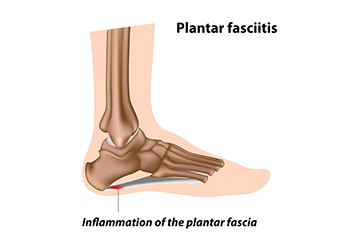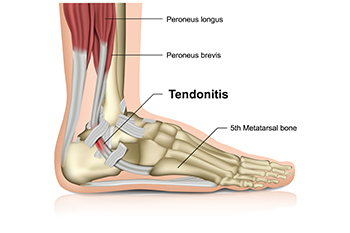Connect With Us
Blog
Items filtered by date: November 2023
Tuesday, 28 November 2023 00:00
Orthotics and Shoe Size

Custom-made orthotics play a vital role in foot health and comfort. They are designed to provide support, alleviate pain, and correct biomechanical issues such as flat feet or high arches. When a podiatrist makes orthotics, the size and fit of your shoes are considered, as the wrong combination can lead to discomfort or negate the benefits of the orthotics. Shoe size is not just about the length, it also involves width and depth, especially when considering the addition of orthotics. Shoes that are too tight while wearing orthotics can cause pressure and discomfort, and shoes that are too loose can result in inadequate support and stability. It is often recommended to choose shoes with a removable insole, offering extra depth and a better fit for the orthotic. Some orthotic-friendly shoes are designed with additional features like a wide toe box or extra depth, ensuring a comfortable fit without compromising the orthotic's function. If you are considering custom-made orthotics, it is suggested that you schedule an appointment with a podiatrist and wear the shoes that are best equipped for orthotic use for a proper fit.
If you are having discomfort in your feet and would like to try orthotics, contact Carrie Frame, DPM from West Virginia Foot & Ankle. Our doctor can provide the care you need to keep you pain-free and on your feet.
What Are Orthotics?
Orthotics are inserts you can place into your shoes to help with a variety of foot problems such as flat feet or foot pain. Orthotics provide relief and comfort for minor foot and heel pain but can’t correct serious biomechanical problems in your feet.
Over-the-Counter Inserts
Orthotics come in a wide variety of over-the-counter inserts that are used to treat foot pain, heel pain, and minor problems. For example, arch supports can be inserted into your shoes to help correct overarched or flat feet, while gel insoles are often used because they provide comfort and relief from foot and heel pain by alleviating pressure.
Prescription Orthotics
If over-the-counter inserts don’t work for you or if you have a more severe foot concern, it is possible to have your podiatrist prescribe custom orthotics. These high-quality inserts are designed to treat problems such as abnormal motion, plantar fasciitis, and severe forms of heel pain. They can even be used to help patients suffering from diabetes by treating foot ulcers and painful calluses and are usually molded to your feet individually, which allows them to provide full support and comfort.
If you are experiencing minor to severe foot or heel pain, it’s recommended to speak with your podiatrist about the possibilities of using orthotics. A podiatrist can determine which type of orthotic is right for you and allow you to take the first steps towards being pain-free.
If you have any questions please contact our office located in Charleston, WV . We offer the newest diagnostic and treatment technologies for all your foot and ankle needs.
Thursday, 23 November 2023 00:00
Are You Suffering From Nerve Damage?
Tuesday, 21 November 2023 00:00
Transformation of Your Feet During Pregnancy

Pregnancy is a transformative journey for a woman's body, and it is not just the baby bump that undergoes changes. The feet also experienced their share of adjustments during this remarkable period. As the body produces the hormone relaxin to prepare for childbirth, it can affect the ligaments and tendons throughout, including the feet. This increased flexibility can lead to a temporary increase in shoe size. Swelling, known as edema, is another common foot change during pregnancy and is often caused by fluid retention. This can make wearing comfortable footwear imperative. Added pressure on the arches can trigger or exacerbate flat feet, resulting in discomfort or pain. Be prepared for these transformations, and remember that they are all part of the incredible journey to motherhood. If you would like more information about how to find relief from foot pain during pregnancy, in addition to learning more about how the feet change during this exciting time, it is suggested that you confer with a podiatrist who can provide you with useful knowledge.
Pregnant women with swollen feet can be treated with a variety of different methods that are readily available. For more information about other cures for swollen feet during pregnancy, consult with Carrie Frame, DPM from West Virginia Foot & Ankle. Our doctor will attend to all of your foot and ankle needs.
What Foot Problems Can Arise During Pregnancy?
One problem that can occur is overpronation, which occurs when the arch of the foot flattens and tends to roll inward. This can cause pain and discomfort in your heels while you’re walking or even just standing up, trying to support your baby.
Another problem is edema, or swelling in the extremities. This often affects the feet during pregnancy but tends to occur in the later stages.
How Can I Keep My Feet Healthy During Pregnancy?
- Wearing orthotics can provide extra support for the feet and help distribute weight evenly
- Minimize the amount of time spent walking barefoot
- Wear shoes with good arch support
- Wear shoes that allow for good circulation to the feet
- Elevate feet if you experience swelling
- Massage your feet
- Get regular, light exercise, such as walking, to promote blood circulation to the feet
If you have any questions please feel free to contact our office located in Charleston, WV . We offer the newest diagnostic and treatment technologies for all your foot and ankle needs.
Tuesday, 14 November 2023 00:00
Common Causes of Plantar Fasciitis Unveiled

Plantar fasciitis, a commn cause of heel pain, is a condition that occurs when the plantar fascia, a thick band of tissue that connects the heel bone to the toes, becomes inflamed and irritated. Several common factors contribute to the development of plantar fasciitis. One primary cause is excessive or repetitive strain on the feet. This often results from activities that place a significant burden on the plantar fascia, like prolonged standing, walking, or running, especially on hard surfaces. Footwear with inadequate arch support or cushioning can exacerbate the condition. Sudden weight gain or obesity is another contributing factor, as it places additional pressure on the feet. Tight calf muscles and Achilles tendons can also lead to plantar fasciitis by altering the mechanics of the foot, affecting the way it absorbs shock and distributes weight. Understanding these common causes is essential for both preventing and managing plantar fasciitis. If you have heel pain, it is strongly suggested that you are under the care of a podiatrist who can effectively diagnose and treat this condition.
Plantar fasciitis can be very painful and inconvenient. If you are experiencing heel pain or symptoms of plantar fasciitis, contact Carrie Frame, DPM from West Virginia Foot & Ankle. Our doctor can provide the care you need to keep you pain-free and on your feet.
What Is Plantar Fasciitis?
Plantar fasciitis is the inflammation of the thick band of tissue that runs along the bottom of your foot, known as the plantar fascia, and causes mild to severe heel pain.
What Causes Plantar Fasciitis?
- Excessive running
- Non-supportive shoes
- Overpronation
- Repeated stretching and tearing of the plantar fascia
How Can It Be Treated?
- Conservative measures – anti-inflammatories, ice packs, stretching exercises, physical therapy, orthotic devices
- Shockwave therapy – sound waves are sent to the affected area to facilitate healing and are usually used for chronic cases of plantar fasciitis
- Surgery – usually only used as a last resort when all else fails. The plantar fascia can be surgically detached from the heel
While very treatable, plantar fasciitis is definitely not something that should be ignored. Especially in severe cases, speaking to your doctor right away is highly recommended to avoid complications and severe heel pain. Your podiatrist can work with you to provide the appropriate treatment options tailored to your condition.
If you have any questions please feel free to contact our office located in Charleston, WV . We offer the newest diagnostic and treatment technologies for all your foot and ankle needs.
Tuesday, 07 November 2023 00:00
An Achilles Tendon Rupture Can Be a Debilitating Injury

An Achilles tendon rupture is a severe and painful injury that affects the Achilles tendon, which is the largest and strongest tendon in the human body. Located at the back of the ankle, this vital band of connective tissue plays a pivotal role in facilitating walking, running, and jumping. When it tears, it can lead to excruciating pain, a loud popping sensation, and the inability to bear weight on the affected leg. The injury often occurs during sports or physical activities that involve sudden, forceful movements. An Achilles tendon rupture is more common among individuals aged 30 to 40, particularly men. It is beneficial to seek immediate medical attention from a podiatrist who can properly diagnose and treat this painful condition.
Achilles tendon injuries need immediate attention to avoid future complications. If you have any concerns, contact Carrie Frame, DPM of West Virginia Foot & Ankle. Our doctor can provide the care you need to keep you pain-free and on your feet.
What Is the Achilles Tendon?
The Achilles tendon is a tendon that connects the lower leg muscles and calf to the heel of the foot. It is the strongest tendon in the human body and is essential for making movement possible. Because this tendon is such an integral part of the body, any injuries to it can create immense difficulties and should immediately be presented to a doctor.
What Are the Symptoms of an Achilles Tendon Injury?
There are various types of injuries that can affect the Achilles tendon. The two most common injuries are Achilles tendinitis and ruptures of the tendon.
Achilles Tendinitis Symptoms
- Inflammation
- Dull to severe pain
- Increased blood flow to the tendon
- Thickening of the tendon
Rupture Symptoms
- Extreme pain and swelling in the foot
- Total immobility
Treatment and Prevention
Achilles tendon injuries are diagnosed by a thorough physical evaluation, which can include an MRI. Treatment involves rest, physical therapy, and in some cases, surgery. However, various preventative measures can be taken to avoid these injuries, such as:
- Thorough stretching of the tendon before and after exercise
- Strengthening exercises like calf raises, squats, leg curls, leg extensions, leg raises, lunges, and leg presses
If you have any questions please feel free to contact our office located in Charleston, WV . We offer the newest diagnostic tools and technology to treat your foot and ankle needs.

